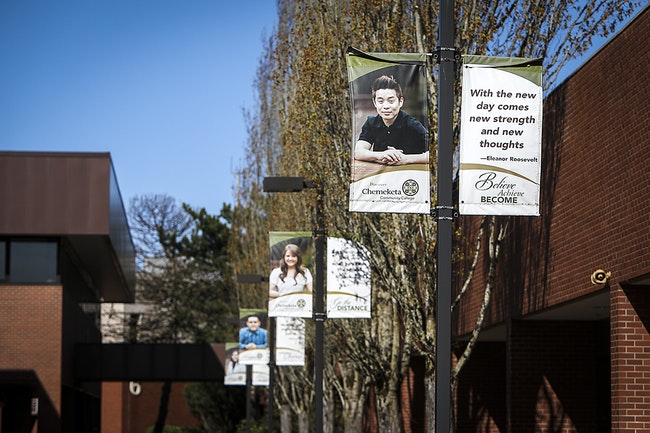
Chemeketa Community College on Thursday, April 16. (Amanda Loman/Salem Reporter)
Gaelen McAllister’s father wasn’t a typical college student.
After immigrating to the U.S. from Ireland, he worked as an engineer for a railroad in southern California. When it was bought out by a company that required all engineers to have college degrees, he enrolled in community college to get a two-year civil engineering degree.
“He just needed something that said ‘engineer’ on it,” McAllister said.
That educational path is front of mind in McAllister’s work as the director of grant development at Chemeketa Community College, where she’s helped secure millions of dollars for college programs intended to attract and retain more students.
“I’ve experienced in my family how important it is to have options to let people access education,” McAllister said.
McAllister came to Chemeketa in the fall of 2019, the latest step in her career working for nonprofit and educational organizations in grant writing and development. She most recently worked for Garten Services, a nonprofit serving people with developmental disabilities, and has lived in Salem since 1994.
Since McAllister took on the role in late 2019, the college has won $15.9 million in competitive grants.
Many of them focus on specific programs to recruit new students and make it easier for them to attend college. Those include the recent Job Corps Scholars program, a $1.1 million grant from the U.S. Department of Labor to offer career-focused certificates and programs to young adults.
“It’s a great opportunity for anybody who wants to come and do a one-year certificate program,” McAllister said. “It provides total funding for students, even for things like childcare if they need it.”
Other recent awards include funds from the U.S. Department of Agriculture to boost the number of Hispanic students in agriculture programs, and a National Science Foundation award to improve enrollment in science, technology, engineering and math programs.
The college has a federal designation as a Hispanic-Serving Institution, meaning at least 25% of the student body is Hispanic, which opens up other grant opportunities.
McAllister works closely with Chemeketa faculty and staff to identify areas where the college might be able to secure money. When she identifies something she thinks fits with Chemeketa’s goals and strategic plan, she’ll send it to the dean to review and see if there’s interest and time to put together a proposal.
Her work is key as the college looks to chart a path forward after years of declining enrollment, including a sharp drop at the start of the pandemic.
Chemeketa’s fall enrollment was 9,460 students this year, dropping from 9,832 in the fall of 2020. In fall 2019, the college had 11,869 students.
Those numbers aren’t unique to Chemeketa – Oregon community colleges collectively lost nearly one in four students from the fall of 2019 to 2020 as the pandemic hit and classes moved online. This fall, the statewide drop was less than 1%, but colleges have a lot of ground to recover.
Jessica Howard, Chemeketa’s president, said the college’s initial pandemic drop in students included many who were eligible for federal Pell grants, which are given to students who have significant financial need.
Through both grant programs and Chemeketa’s share of federal Covid aid, Howard said the college is focused on helping students stay at Chemeketa through efforts like providing free digital textbooks and clearing some student account balances so an unpaid fee didn’t prevent students from enrolling for next quarter.
“All of those supports for students are designed to help them be successful and to help keep students with us,” Howard said.
She said the grant office’s success rate in getting funding has increased recently, giving the college more ways to recruit and retain students. That’s key to longer-term plans to boost enrollment.
“Our grants office has really hit its stride,” Howard said.
McAllister said discussions about college are often focused on young people who have just graduated high school. In line with the college’s long-term goals, she often looks for grants that will help non-traditional students: refugees who have recently arrived in Salem, or mid-career professionals who need a certificate to advance.
“We focus a lot on your typical four-year degree, but there’s other options for students that might work better for them, that might work better for what they’re interested in,” McAllister said.
Shesaid it remains a challenge for her to make sure prospective and current Chemeketa students know about the options available to help them and the number of new programs available.
“I think it’s probably the most affordable time ever to come to college,” she said.
Correction: This story was updated to reflect that Galen McAllister’s father worked for a company which required all engineers to have college degrees, not all employees. Salem Reporter apologizes for the error.
Contact reporter Rachel Alexander: [email protected] or 503-575-1241.
JUST THE FACTS, FOR SALEM – We report on your community with care and depth, fairness and accuracy. Get local news that matters to you. Subscribe to Salem Reporter starting at $5 a month. Click I want to subscribe!









